Women of the road: impressive Canadian women’s marathon performances
Dayna Pidhoresky's victory at the 2019 Canadian Marathon Championships earned her the only sure spot in the 2020 Olympic marathon
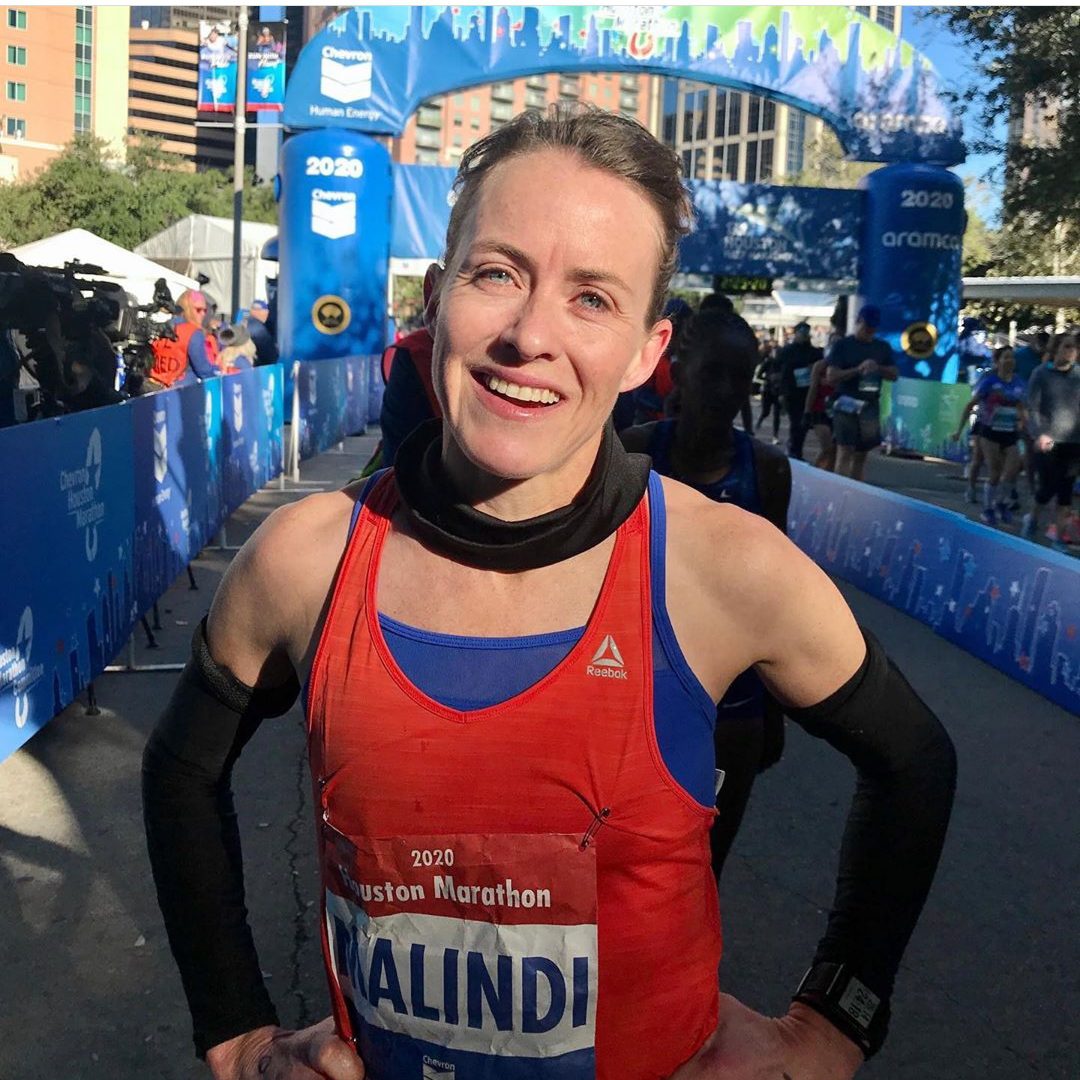
By: Andrew McKay
Malindi Elmore was having a moment.
Actually, all of Canadian women’s running was having a moment, and Elmore was suddenly at the centre of it. Elmore set a new Canadian record in the women’s marathon in January, running 2:24:50 to cut more than two minutes off Rachel Cliff’s previous mark. Elmore’s third-place finish in Houston had all but guaranteed her a spot on Canada’s 2020 Olympic team, which is fitting when you consider the influence the 2004 Olympian had on so many of the women who were still aiming for a spot in Tokyo.
What’s surprising is how Elmore ended up in this position. By her own admission, the 1,500m specialist was “pretty much done” with competitive running after failing to qualify for the 2012 Olympics. Without regret, she moved into triathlon and placed third at Ironman Arizona in 2016, finishing in under nine hours. But the birth of her second child meant the days of four- to six-hour weekend training rides were in the past, so she got back to running–“just for fitness.” Within four months, she went from trying to run an hour without stopping, to a 2:32 finish at the 2019 Houston Marathon (her debut at the distance). “Once we saw the Olympic criteria (2:29:30 for women) come out, that was the goal,” says Elmore. “That was something that made sense.”
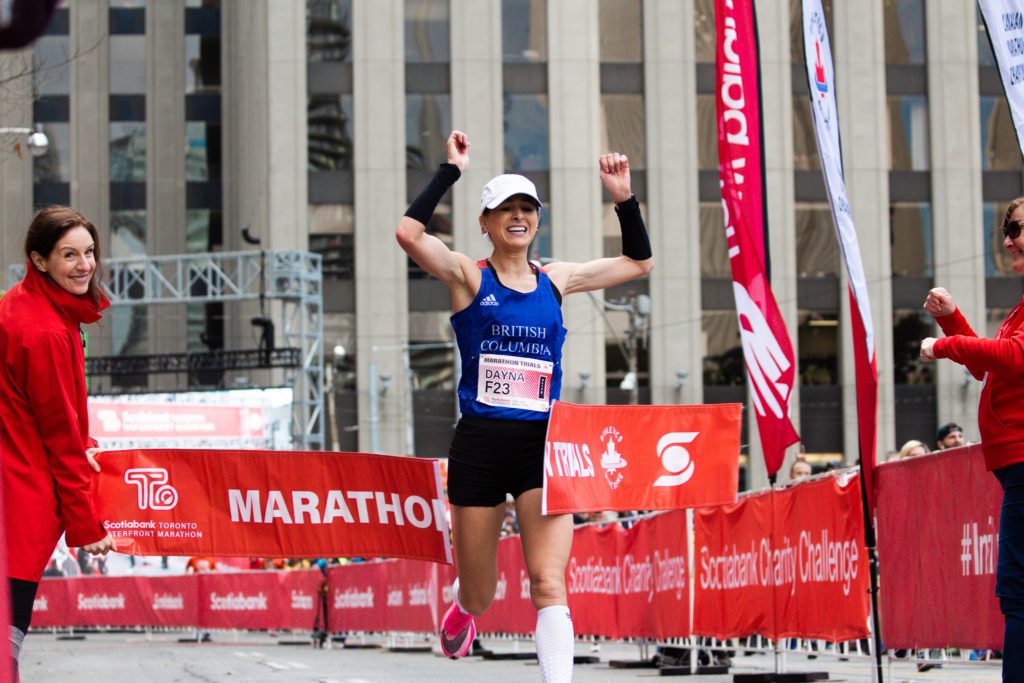
Women can achieve the Olympic standard in any of three ways:
• By beating the World Athletics (formerly IAAF) qualification time (2:29:30 – also known as Olympic standard) in a sanctioned marathon
• A top-10 finish at the 2019 World Championships, or in any of the six Abbott World Major Marathons during the qualification period
• A top-five finish in a certified World Athletics Gold Label marathon (anywhere in the world – Canadian examples include the Scotiabank Toronto Waterfront Marathon and the Scotiabank Ottawa Marathon).
In addition, the 2019 Scotiabank Toronto Waterfront Marathon served as the Canadian Olympic trials, with the top Canadian finishers (male and female) gaining an automatic place on Team Canada, provided they met the Olympic standard. Dayna Pidhoresky ran 2:29:03 to finish as top Canadian, 27 seconds under the Olympic standard, guaranteeing her place in Tokyo. She was the first Canadian female named to Team Canada.
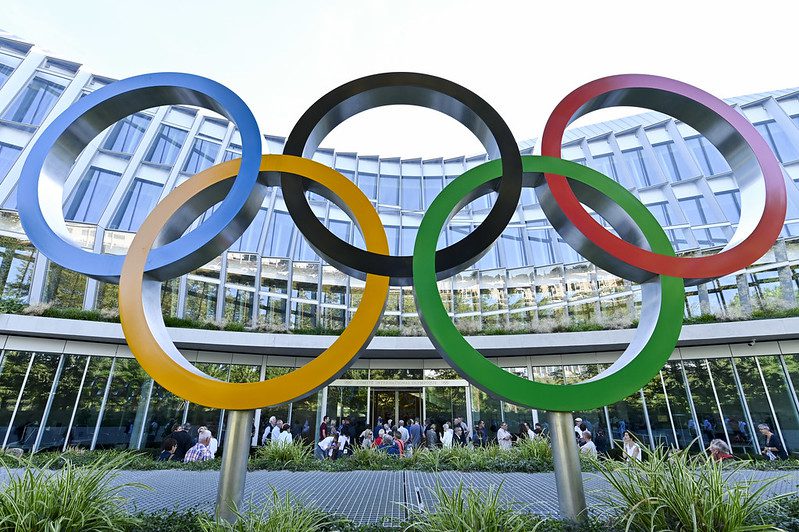
Athletics Canada will choose its team from the pool of runners who meet any of the above criteria, and if they can’t find three qualified runners, they will turn to the new World Athletics points ranking system to select a world-ranked competitor to fill out the final spot(s). That won’t be an issue for Canada though – the embarrassment of riches in the women’s marathon today means Canada’s problem isn’t too few qualified runners, but too many.
With Pidhoresky in place, Canada had two remaining spots to allocate. The qualification period ran from January 1, 2019 to May 31, 2020, with the initial nomination meeting scheduled for May 4 and final selections a month later. Then coronavirus happened.
After Elmore’s amazing race in Houston, Canada had four women with Olympic credentials, and more knocking on the door throughout the spring. How those results are weighted by Canadian selectors will have a big impact on which women go to Tokyo in 2021.
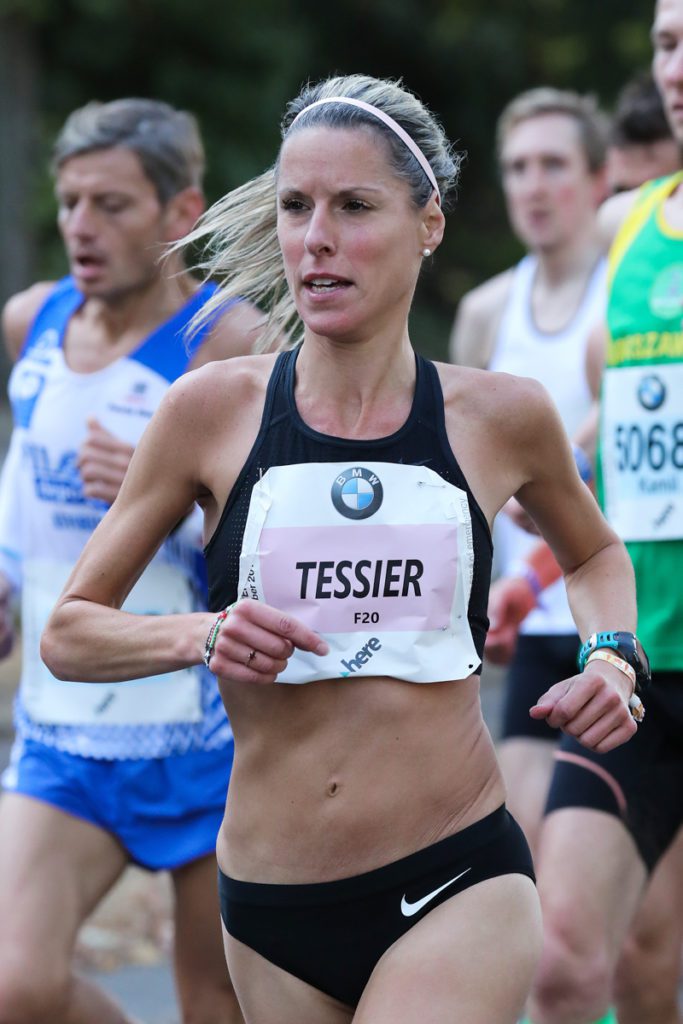
Elmore, by any measure, should be a lock. Not only does she hold the fastest qualifying time, she also finished third in a Gold Label race. Elmore had lofty goals going into Houston, and she smashed them. She knew it would take something much faster than the Olympic standard to get onto the Olympic team. She also knew she wasn’t interested in going after Tokyo for its own sake.
“I wanted to know, ‘what can I get out of myself?’” Elmore, 40, said. “In the past, I got bogged down chasing Olympic dreams. I came into this with a really fresh perspective. It’s made it a lot more fun, and put a lot less pressure on myself.”
With that approach came a simple challenge: she would only get one race to prove her mettle. Reloading for a spring marathon wasn’t on the table if things didn’t work out in Houston.
“We knew it was a one-shot deal. I had to be ready to give my best performance. We were looking at what would set me up best for Tokyo; I wanted to be in the best possible position to run well in the Olympics.”
To move forward with her own Olympic dreams, Rachel Cliff had to forget the past. In 2016, she qualified in the 5,000m, but was left off the team after finishing fourth in the Olympic Trials. Athletics Canada took Andrea Seccafien and Jessica O’Connell to Rio, leaving the third available spot empty.
“It’s something I had to put behind me to be happy,” Cliff said. “Going through something like that can be positively motivating, but it can also be negative. I don’t agree with leaving athletes at home – it gave me a little bit of hunger.”
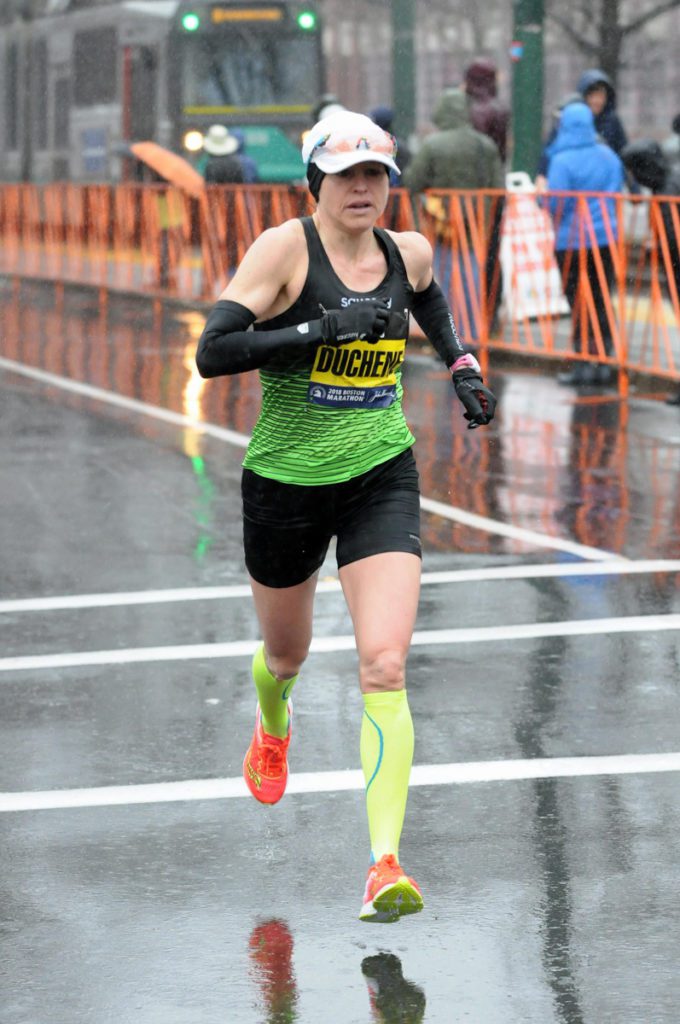
Cliff fed that hunger with an incredible stretch of running in 2019 that culminated in a bronze medal in the 10,000m at the Pan Am Games in Lima, two half-marathon Canadian records, and the Canadian marathon record, which stood until Elmore broke it at Houston in January 2020.
One might think that setting a new women’s marathon record (which had previously been broken once in 34 years, by Lanni Marchant in 2013) would cement Cliff’s place on Team Canada for 2020. But a year is a long time, and a lot happened after Cliff’s record-setting run at the Nagoya Women’s Marathon in March 2019. It was nerve-racking for Cliff as her Canadian competitors piled up results around her, but the lessons of 2016 have taught her not to let herself be defined by a selection committee. “Making the Olympics is kind of this binary thing,” she said. “It’s very important to keep this control of yourself.”
Helping her manage the journey was Cliff’s husband, Chris Winter. Winter went through a similar ride, missing out on a spot in the 2012 Olympics before making Team Canada in 2016 in the 3,000m steeplechase. “I’m definitely lucky to have Chris,” Cliff said. “He was very motivational, understanding, and supportive.”
The nature of the marathon cycle makes it necessary to build towards a specific date, so when it came to picking her next race, Cliff was methodical in choosing the Tokyo Marathon on February 29th. Not only was the race early enough in the year to let her prepare adequately if the Olympic call came; it was the same day as the U.S. Olympic Marathon Trials, letting Cliff get on the same training timeline as her American counterparts, going into the Olympics.
But you know what they say about the best-laid plans. When the Tokyo Marathon organizers cancelled the mass field race over coronavirus concerns, it left an elite field where the slowest male had a PB of 2:19:45, and only 13 women had a faster PB than Cliff’s 2:26:56. Faced with the likelihood of running a sparse race, without any pacers, Cliff made the difficult decision to withdraw from the 2020 race.
“It’s been tough (to change plans) because I’ve been tapering for this one,” she said. “Whether I decide to jump into another marathon this spring remains to be seen.” With the postponement of the Games to 2021, that decision became moot.
Cliff was firmly entrenched in a battle royal that was kicked off last summer by the unlikeliest of competitors: Lyndsay Tessier.
Tessier is something of a hero among recreational runners in the Toronto area: the 41-year-old with a day job, a teacher who started running with a group out of a local running shop in 2011 and climbed the ranks all the way to the 2019 World Championships in Doha. With a midnight start time and temperatures around 35 C, the Worlds marathon was more notable for its victims than its successes. In what can best be described as a battle of attrition, Tessier started near the back of the pack and held her ground, picking off competitors one by one and finishing in ninth place – satisfying the Olympic qualification criterion of a top-10 finish.
The whole thing – the top-10 finish, the Olympic consideration – took Tessier by surprise. “I was so hesitant to ever think that my name was in that mix,” she said. “I didn’t go into Worlds thinking I would place. I didn’t really see myself at that level at the time. It was a lot to digest; I was in a bit of denial.”
Regardless of whether Tessier’s run in Doha earned her a spot on Team Canada, she’d come to terms with her place in Canadian athletics today. “To be part of the conversation [around Tokyo] is very cool,” she said. “Now I’m really proud to be in this cohort of women.”
As the 2019 outdoor season wound down, there was one wild card left to be played. After her surprise debut in Houston in 2018, Elmore had targeted the 2019 Scotiabank Toronto Waterfront Marathon, which was also the Olympic Trials.
In a nod to the U.S. Trials, the Toronto Waterfront Marathon/Canadian Marathon Championships took on triple duty, with the top Canadian who also met the Olympic standard getting a guaranteed spot on Team Canada.
For Elmore, the goal was simple: break the Canadian record, win the Trials, and make the Canadian Olympic team. But a week before the race, hamstring tightness forced her to pull out of Toronto and delay her return to the road. In Elmore’s absence, an under-appreciated but determined Dayna Pidhoresky slipped through to take the win – and the guaranteed Olympic spot that came with it. Pidhoresky’s winning time of 2:29:03 beat the standard by 27 seconds, securing her trip to Tokyo.
“Ever since I started running, my goal was sub 2:30,” Pidhoresky said.
The win was somewhat ironic, as Pidhoresky, 33, describes 2019 as a down year. “Last year, I felt like every race I ran, I was a little disappointed in it,” she said. “Leading into Toronto, nothing was going well. I was thinking of not going, but I didn’t want to pull the plug too early.”
Pidhoresky met the challenge, and was taking some inspiration from Elmore as she looked forward to Tokyo and beyond. While she felt some regret at not being in peak marathon shape and missed the anticipation of the build towards a spring race, Pidhoresky instead waited to see who would join her on the road to Tokyo.
“I’m completely aware that other people would love to be in the position that I’m in,” she said.
Pidhoresky, as it turns out, was the only Canadian woman who met the Olympic standard at the Trials race, with Emily Setlack finishing an agonizing 18 seconds off the mark. Setlack joins a group of Canadian women looking to perform in the spring to get their names into the Olympic conversation. She ran a strong 1:11 half-marathon in Houston.
Krista DuChene was planning to return to the 2020 Boston Marathon, where in 2018 she shocked the running world by finishing third on a day made for Canadian runners. Boston’s net elevation drop exceeds the one metre per kilometre allowable for the Olympic standard, so DuChene’s only shot was to finish in the top 10 again, and its postponement to Sept. 14 means DuChene could still use it to qualify for Tokyo.
A week after Boston, Kinsey Middleton looked to double-dip at the Virgin Money London Marathon with either a top-10 finish or a time qualifier. If you’re looking for a speedy time trial, London’s the place to go: there were 17 women on the elite women’s start line with personal bests faster than the Olympic qualifying time, and 15 faster than Cliff’s 2019 Canadian record.
While there are a lot of great Canadian marathoners, there aren’t so many that they aren’t a somewhat tight-knit group. But as the competition for the Olympic spots heated up, this became complicated, as Tessier explains: “The interesting problem is I look at these runners like Dayna, Leslie (Sexton), and Kinsey as friends,” Tessier said. “But now suddenly they’re competitors. You have to be really realistic. I’ve known afterwards that I’ve done something very special to me. I’ve also known I’m in the company of these women who are surpassing expectations.”
Like Elmore, Tessier was letting the chips fall where they may. If a ninth-place finish at the World Championships didn’t get her into the Olympics, she’d live with it. “Whatever happens with the Olympics, I’m going to enjoy it. That’s something I’m not to wrapped up in; you can lose sight of how much you love the sport. It’s done so much in my life, and I don’t want to diminish it.”
Elmore, for the time being, was enjoying the ride. She called her run at the Canadian record and Olympic team a “fun family project”– her 5-year-old son would set up a water station at the playground in Beasley Park in B.C.’s Lake Country, so he could pass her bottles as she ran by.
At the time of writing, Elmore was back home, running the trails around Kelowna, somewhat unaware of the impact she’d had on the Canadian running community in the last year. “I don’t really feel like I’m an elite runner,” she said. “It’s so amazing to see so many women running so well. I do think we’ve broken down some of the perceived barriers. There are a lot of different ways to get to this path.”
Just before this issue went to print, the 2020 Olympics were postponed and rescheduled to July 2021 because of covid-19. Canada’s athletes supported the decision, even if it put their Olympic hopes on hold for another year. “Ever since about mid-February, I have had my doubts about the viability of the Games,” Elmore said, “so it was mostly a sense of relief for me that they were being postponed and not outright cancelled.”
Pidhoresky agreed: “It’s been a relief to know that the possibility of cancellation is no longer on the table, and a new window for the Olympics is roughly the same time, but just a year removed. It gives us the option now of looking for a fall marathon to fill the gap, and it certainly gives us enough time to plan the 2021 season so that I am ready and fit for an early August marathon.”
Elmore would also like to fit in a fall marathon – assuming the fall races happen – as a chance to prove her fitness for selection for 2021. But more importantly, she’s just hoping the world has started to heal by then. “I’m happy that the Olympics have been rescheduled, and really hope the world is in a safer and healthier spot and we can proceed with the Olympics,” she said.
This story originally appeared in the May & June 2020 issue of Canadian Running.
Andrew McKay is a proud member of the Beaches Runners Club, Lower East Siders and Ajax Wannabes. He worked on four Olympic Games and the 2015 Pan Am Games with Yahoo Sports


